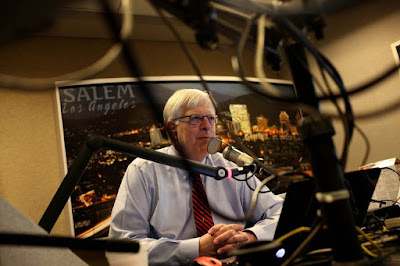Does “Music Trump Politics”? Dennis Prager and the Santa Monica Symphony Orchestra
By Ted Gordon
 |
| Dennis Prager in 2013. Photo Credit: Michael Robinson Chavez, LA Times (via Getty Images) |
In March of this year, Guido Lamell, the music director of the Santa Monica Symphony Orchestra (SMSO)—a community orchestra comprised mostly of volunteers, which was founded in 1945 by Los Angeles studio musicians— invited conservative radio personality Dennis Prager to guest conduct Haydn’s Symphony No. 51 at the SMSO’s annual fundraising concert, held at Los Angeles’ Walt Disney Concert Hall. Prager had previously raised money for and conducted several orchestras in Southern California, he writes, because he “want[s] to expose as many people to classical music as possible.” For Prager, “classical music” is a core component of Western culture, which he claims is under attack by secularism, multiculturalism, the Muslim faith, same-sex marriage, academia in general, and the “war on Christmas.” In addition to his stance on “Western culture”, Prager has claimed that “heterosexual AIDS […] has been entirely manufactured by the Left,” and has also recently teamed up with comedian Adam Corolla to make a documentary film about safe spaces, rape culture, and free speech on college campuses, tweeting “There’s no culture of rape at our universities. There’s a rape of the culture.” In addition to finding Prager’s radio program “interesting,” Lamell praised Prager’s promotion of classical music, which has been a constant talking point in Prager’s show since he began his radio career in 1982. Lamell recalls that Prager “would play excerpts of classical music […] and talk about the glories of Beethoven.”
Prager’s invitation immediately sparked controversy, launching an otherwise insignificant performance of a Haydn symphony into the national spotlight. In an interview on National Public Radio, Lamell sidestepped political issues by arguing that his invitation to Prager was based solely on the the latter’s support for classical music, and the idea that Prager would draw a new kind of audience to the SMSO: “I never heard anyone else on national radio talking about classical music. We knew that he might be reaching an audience that classical arts don’t always reach.” Lamell’s invitation was explicitly intended to create a new group of people for desiring, and taking pleasure in, classical music–a pleasure, according to Lamell, that is apolitical. Lamell argued that music and politics “are two entirely different worlds: Political discourse is one realm, and music is another realm.” Comparing music to an “eternal flame, Lamell chose his words carefully: “music trumps politics.” Prager, for his part, echoes this sentiment: “great music should transcend political differences.”
Several members of the SMSO felt otherwise. Four performers wrote and co-signed a letter asking people not to attend the concert, arguing that Prager’s presence would alienate their community of players, patrons, and audience–many of whom count themselves among the groups that Prager scorns: LGBTQ people, Muslims, and atheists. They write: “Dennis Prager’s publicly stated positions are fundamentally at odds with our community’s values and […] the proposed concert would deeply damage our orchestra’s relationship with our community.” They cited Prager’s moralizing, apocalyptic rhetoric and his hateful speech, including his propagation of the myth that homosexual men are endemic pedophiles; his attack on Representative Keith Ellison for choosing to be sworn into office on a Quran; his arguments for the virtue of racially homogenous societies; and his condemnation of multiculturalism as “the beginning of the end of the United States as we know it.”
In response, Prager published an article on August 1st in The National Review that declared: “they’re trying to prevent me from conducting a symphony.” Prager presented the pushback against his role as guest conductor as an issue of free speech, of the “illiberal left” not being willing to allow him to conduct music because of his political views. The views in question, he argued, are not bigoted, racist, or hateful–terms which he claims have been “disemboweled” by the Left. Instead, Prager argues that they should be “tolerated” by a liberal society, just as his presence should be “tolerated” by an orchestra that had previously made attempts at supporting the LGBTQ community and attracting a racially diverse audience.
Prager’s stance might be understood as a series of arguments that come close to “kettle logic”: that he’s not, in fact, hateful; even if the “Left” understands him as hateful, his position should be tolerated; and conducting a symphony is not even political speech, anyway. Yet Prager’s performance with the SMSO is of course political: it uses the “genius” of classical music as evidence towards his political ideology of “Western” supremacism. In addition, more practically speaking, his presence at this concert worked towards the creation of a new political group: people united by their supposedly “apolitical” support of “Western Art Music”. In the National Review, a week before the concert, Prager wrote: “Like Haydn, I think music is one of those few things that can bring people together.”
So we must ask: who, exactly, was brought together by Prager and Lamell? On August 16th–four days after the violent eruption of racism, neo-Nazism, and white supremacy in Charlottesville–the SMSO performed to a nearly sold-out audience. Who attended? According to Rick Schultz’s review in the LA Times, there was a smattering of applause when Lamell asked the audience who was there from Santa Monica; when he asked “‘Are there any fans of Dennis Prager here?’ The audience roared.” Prager had exhorted his readership to buy tickets and attend the concert; when Lamell asked the audience at the beginning of the concert, “‘How many are hearing a symphony orchestra for the first time?’, the applause indicated a significant number.” Lamell and Prager’s desired “new audience” for classical music had certainly arrived. For Prager, Haydn’s music mirrors the kind of sociality he wants to see in the world: as he said from the stage, it “represents an ideal of the world ‘where we could all sublimate our egos for something that is good.'”
That one should “sublimate one’s ego” is the general logic that allows Prager to denounce what he likes to call “political correctness” from minority groups: LGBTQ people who speak out against homophobia, people of color who speak out against systemic racism, and women who speak out against rape culture. For Prager, these examples of what he calls “identity politics” are only problematic when marginalized people engage in them; he vigorously defends “Western culture” as an unmarked, but implicitly white, “Judeo-Christian” culture. Equating Haydn’s music with this ideology portrays it as a kind of “pure,” non-political cultural activity–which seems to have been convincing not only for Prager’s fans, but also for Lamell and most of the orchestra that was able to “tolerate” Prager. As Prager noted after the concert, he sold out all but two rows of seats; only seven of 70 orchestra members refused to play; and the SMSO’s Board of Directors invited him to conduct the orchestra again. Prager praised the “tolerance” of the SMSO’s board: “these people put the interests of their orchestra, of music, and of tolerance ahead of their political and social views.” Prager’s intolerance of women, people of color, queer, and secular people was tolerated because it was not seen as relevant to the “apolitical” performance of the music at hand: Haydn’s Symphony No. 51.
Haydn, of course, has had a long history with politics. In addition to the widespread use of his Kaiserhymne by political entities ranging from the Austro-Hungarian Empire to to Nazi Germany, Haydn’s “pure” instrumental music has also fueled explicit ethno-nationalism. Where Prager claims “race-blindness” while retaining coded language that leaves the whiteness of “Judeo-Christian” or “Western” culture unmarked, others have been more explicit about how music figures into their racial politics. Writing between world wars, Viennese music theorist Heinrich Schenker sought to revitalize Haydn as a new patriarch in a nationalist, reparative narrative of German music. As Bryan Proksch has shown, “Papa Haydn” was routinely dismissed by German critics and scholars throughout the 19th century; compared to Beethoven, Edouard Hanslick called him a “Klopstock”, while A.B. Marx described him as “childlike.”[1] Yet as Proksch writes, Schenker sought to “turn the restoration of Haydn’s stature as a compositional genius into a crucial battle within his larger fight to reclaim Germany’s cultural history in the wake of the First World War.”[2]
Where Prager praises Haydn’s “genius” as a result of hard work—avoiding a discussion of the political, social, and economic histories of his identity—Schenker is much more explicit: Haydn, an ethnic German, was part of an “aristocracy of genius” that was given to German men by God.[3] Though Prager would of course disavow a link between his characterization of Haydn and Schenker’s proto-fascist ideology, the connection remains: Schenker links musical genius to the German race, while Prager links musical genius to a monolithic “Western” culture that is implicitly patriarchal, heteronormative, and white. The very notion of the “genius” of Haydn, for Schenker, was contingent on Haydn’s identity: in 1921, Schenker began the first issue of his music periodical Die Tonwille with an opening editorial entitled Von der Sendung der deutschen Genies [“The Mission of German Genius”], which claims “a Kant or Goethe, a Haydn or Mozart or Beethoven could work and breathe only in Germany.”[4] Schenker’s ethno-nationalist fantasy envisions a future in which “Papa Haydn” would be finally recognized as an ethnic German patriarch: “adapting Goethe’s words, I issue a call: The fathers are the True! On to the fathers, to Father Haydn!”[5]
On August 17th, a day after the concert and four days after the white supremacist rally in Charlottesville, the board of the American Musicological Society issued a statement strongly condemning “neo-nazis, white supremacists, Ku Klux Klan members, white nationalists, and fascists”. In their statement, they assert that they “seek to foster a safe and supportive community for all of our members and guests at all times and in all places”, and that they “support the equal rights of all persons to a life free of violence and hatred, including the rights of those from all races and ethnicities, gender and sexual orientations, religions, national origins, and abilities.” As scholars, we must think seriously and carefully about what we mean when we talk about “classical music”–and how to remain vigilant against the promotion of “Western Art Music” in the name of “Western supremacy” built on hatred, fear, and bigotry.
Ted Gordon is a PhD Candidate in the History and Theory of Music at the University of Chicago. His research connects music, technology, desire, and politics. His dissertation project examines experimental musical communities in the San Francisco Bay Area in the 1960s and their relationship to larger trends in American technoscience.
[1] Bryan Proksch. ““Forward to Haydn!”: Schenker’s Politics and the German Revival of Haydn.” Journal of the American Musicological Society 64, no. 2 (2011): 320
[2] Ibid.
[3] Suzannah Clark. “The Politics of the Urlinie in Schenker’s Der Tonwille and Der freie Satz.” Journal of the Royal Musical Association 132, no. 1 (2007): 143
[4] Heinrich Schenker. “Von der Sendung des deutschen Genies,” [trans. Bent as “The Mission of German Genius”]. In Der Tonwille 1 (1921), 4.
[5] Heinrich Schenker. “Haydn: Sonate Es-Dur” [Trans. Snarrenberg as “Haydn’s Sonata in E Major, Hoboken XVI:52” In Der Tonwille 3 (1922), 3–21. More info here: http://www.schenkerdocumentsonline.org/profiles/work/entity-001742.html


